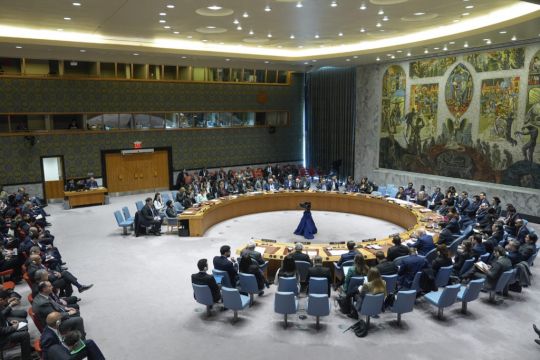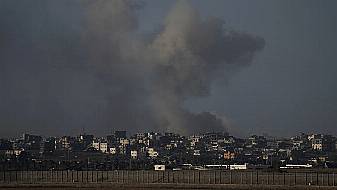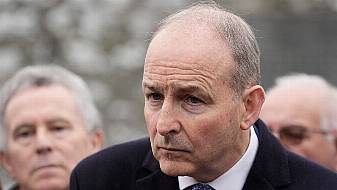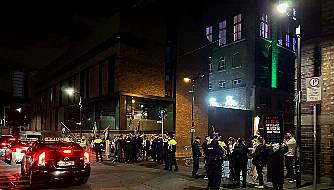The United States has vetoed an Arab-backed and widely supported UN resolution demanding an immediate humanitarian ceasefire in the Israel-Hamas war in the embattled Gaza Strip, saying it would interfere with negotiations on a deal to free hostages abducted in Israel.
The vote in the 15-member Security Council was 13-1 with the United Kingdom abstaining, reflecting the strong support from countries around the globe for ending the more than four-month war, which started when Hamas militants invaded southern Israel, killing about 1,200 people and taking 250 others hostage.
Since then, more than 29,000 Palestinians have been killed in Israel’s military offensive, according to the Gaza Health Ministry which says the vast majority were women and children.
It was the third US veto of a Security Council resolution demanding a ceasefire in Gaza and came a day after the United States circulated a rival resolution that would support a temporary ceasefire in Gaza linked to the release of all hostages and call for the lifting of all restrictions on the delivery of humanitarian aid.
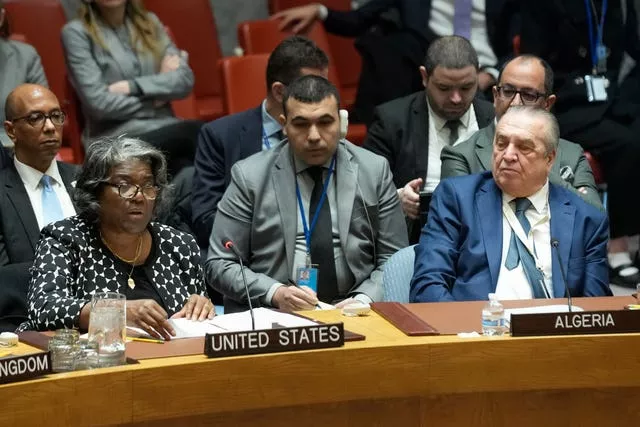
Virtually every council member – including the United States – expressed serious concern at the impending catastrophe in Gaza’s southern city of Rafah, where some 1.5 million Palestinians have sought refuge, if Israeli Prime Minister Benjamin Netanyahu goes ahead with his plan to evacuate civilians from the city and move Israel’s military offensive to the area bordering Egypt, where Israel says Hamas fighters are hiding.
Before the vote, Algeria’s UN ambassador Amar Bendjama, the Arab representative on the council, said: “This resolution stands for truth and humanity standing against the advocates for murder and hatred.”
“A vote in favour of this draft resolution is a support to the Palestinians’ right to life,” he said.
“Conversely, voting against it implies an endorsement of the brutal violence and collective punishment inflicted against them.”
US ambassador Linda Thomas-Greenfield countered by saying the United States understands the council’s desire for urgent action but believes the resolution would “negatively impact” sensitive negotiations on a hostage deal and pause in fighting for at least six weeks.
If that happens “we can take the time to build a more enduring peace”, she said.
The proposed US resolution, Ms Thomas-Greenfield said, “would do what this text does not – pressure Hamas to take the hostage deal that is on the table and help secure a pause that allows humanitarian assistance to reach Palestinian civilians in desperate need”.
She told reporters later that the Arab draft did not link the release of the hostages to a ceasefire, which would give Hamas a halt to fighting without requiring it to take any action.

That would have meant “that the fighting would have continued because without the hostage releases we know that the fighting is going to continue”, she said.
Israel’s UN ambassador Gilad Erdan said the word ceasefire is used in the Security Council, the General Assembly and by UN officials “as if it is a silver bullet, a magical solution to all of the region’s problems”.
He called that “an absurd notion”, warning that a ceasefire in Gaza would enable Hamas to rearm and regroup and “their next attempted genocide against Israelis will only be a question of when, not if”.
He pointed to Hamas statements vowing to repeat the atrocities of October 7 “again and again and again until Israel is annihilated”.
Riyad Mansour, the Palestinian UN ambassador, shot back that the “message given today to Israel with this veto is that it can continue to get away with murder”.
He warned that more babies will be killed and orphaned, more children will die of hunger, cold and disease, more families will be threatened with further forced displacement, and Gaza’s entire 2.3 million population will be left without food, water, medicine and shelter.
And in a sharply critical message to the United States, Israel’s closest ally, Mr Mansour said: “It means that human lives that could have been saved are instead being forsaken to Israel’s genocidal war machine, deliberately, knowingly, by those who oppose a ceasefire.”
What happens next remains to be seen.

The 22-nation Arab Group could take its resolution to the UN General Assembly, which includes all 193 UN member nations, where it is virtually certain to be approved.
But unlike Security Council resolutions, assembly resolutions are not legally binding.
Ms Thomas-Greenfield told the council the United States “will work in earnest in negotiating” on its proposed resolution, leaving time for all council members to comment, “rather than impose an arbitrary deadline for the vote”.
The defeated Arab-backed resolution would have demanded an immediate humanitarian ceasefire to be respected by all parties, which implies an end to the war.
By contrast, the US draft resolution would underscore the Security Council’s support for a temporary ceasefire “as soon as practicable, based on the formula of all hostages being released”, and call for “lifting all barriers to the provision of humanitarian assistance at scale”.
It is the first time the US has used the word “ceasefire”, as opposed to cessation of hostilities.
The Arab draft would also have demanded the immediate release of all hostages, rejected the forced displacement of Palestinian civilians, called for unhindered humanitarian access throughout Gaza, and reiterated council demands that Israel and Hamas “scrupulously comply” with international law, especially the protection of civilians.
Without naming either party, it would have condemned “all acts of terrorism” and reiterated the council’s “unwavering commitment” to a two-state solution with two democratic states, Israel and Palestine, living side-by-side in peace.

In measures sure to anger Israel – and reinforce differences and tensions between US President Joe Biden and Israel’s Mr Netanyahu – the US draft resolution reiterates the same unwavering commitment to a two-state solution, which the Israeli leader opposes.
Mr Biden has repeatedly called on Israel to protect Palestinian civilians, and the draft resolution says Israel’s planned major ground offensive in Rafah “should not proceed under current circumstances”.
And it warns that further displacement of civilians, “including potentially into neighbouring countries”, a reference to Egypt, would have serious implications for regional peace and security.
In another criticism directed at Israel, the US draft “condemns calls by government ministers for the resettlement of Gaza and rejects any attempt at demographic or territorial change in Gaza that would violate international law”.
While this was the third US veto of a Security Council resolution demanding an immediate ceasefire, the council has adopted two resolutions on Gaza where the US abstained.
Its first resolution, on November 15, called for “urgent and extended humanitarian pauses” in Gaza to address the escalating crisis for Palestinian civilians during Israel’s aerial and ground attacks.
On December 22, the council adopted a watered-down resolution calling for immediately speeding aid deliveries to hungry and desperate civilians in Gaza, but without the original plea for an “urgent suspension of hostilities” between Israel and Hamas.
It did call for “creating the conditions for a sustainable cessation of hostilities”.
The steps are not defined, but diplomats said it was the council’s first reference to stopping fighting.
